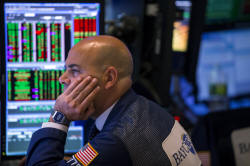Global Markets: U.S. stocks upbeat on infrastructure deal, oil dips
 Send a link to a friend
Send a link to a friend
 [June 25, 2021] By
Carolyn Cohn [June 25, 2021] By
Carolyn Cohn
LONDON (Reuters) - U.S. stock index futures
ticked up on Friday after a strong overnight showing for U.S. and global
equities as President Joe Biden secured a bipartisan Senate
infrastructure deal, though oil lost some shine after a strong week.
Investors have been looking to an infrastructure agreement to extend the
U.S. recovery after massive fiscal stimulus helped the U.S. economy grow
at a 6.4% annualized rate in the first quarter. The plan is valued at
$1.2 trillion over eight years, $579 billion of which is new spending.
But getting bipartisan agreement on the infrastructure deal required
Biden to sacrifice some of his ambitions on schools, climate change
mitigation and support for parents and caregivers, as well as tax
increases on the rich and corporations.
Sebastien Galy, senior macro strategist at Nordea Asset Management, said
the deal was "likely big enough for the economy without overheating it
unnecessarily," adding in a note that it meant "growth expectations
improve somewhat".

S&P 500 e-minis rose 0.1% after the S&P 500 gained 0.58% and the Nasdaq
Composite added 0.69% on Thursday, lifting both indexes to record-high
closes.
MSCI's all-country index rose 0.22%, nearing a record high reached on
June 15 and bringing gains for the week to more than 2%.
European stocks were steady on the day and up 1% on the week, after also
hitting record peaks earlier this month.
Britain's FTSE 100 index was up 0.1% though Germany's DAX dipped 0.2%.
Monetary and fiscal stimulus around the world in response to the
COVID-19 pandemic is boosting financial assets, despite an uneven pace
of recovery between regions, said Eddie Cheng, head of international
multi-asset portfolio management at Wells Fargo Asset Management.
"Bonds go up, equity goes up, commodities go up - that is very much a
liquidity-driven market," Cheng said.
Oil prices fell but remained on track for a fifth consecutive weekly
gain, as growth in demand is expected to outstrip supply on bets that
OPEC+ producers will be cautious in returning more output to the market
from August.
U.S. West Texas Intermediate crude fell 0.27% to $73.10 per barrel and
global benchmark Brent crude was at $75.37, down 0.25%.
Both benchmark contracts settled on Thursday at their highest levels
since October 2018.
[to top of second column] |

A trader looks at stock prices on a screen while working on the
floor of the New York Stock Exchange shortly before the closing bell
in New York August 26, 2015. REUTERS/Lucas Jackson/Files

Alongside growth expectations, markets are also fretting about inflation.
The core personal consumption expenditures index, an inflation gauge tracked
closely by the Federal Reserve, is expected to post year-on-year gains of 3.4%
on Friday.
"I'm not necessarily a big believer that (inflation) is going to be transitory.
I think it's going to be prolonged," said Drew Horter, CIO, Tactical Fund
Advisors in Cincinnati.
"It's a bigger problem than the Fed's actually letting us know."
BofA expects U.S. inflation to remain elevated for two to four years, and only a
market crash will prevent central banks from tightening in the next six months,
the investment bank's top strategist Michael Hartnett said in a note on Friday.
The dollar index was down 0.1% at 91.753 as investors continued to weigh the
likelihood of Fed tightening in the face of persistent inflation.
The Japanese yen was steady at 110.76 and the euro gained 0.1% to $1.1942.
Sterling was down 0.1% at $1.3912, on track for its worst month versus the
dollar since September, after the Bank of England kept the size of its stimulus
programme unchanged and left its benchmark interest rate at an all-time low of
0.1% on Thursday.
Benchmark 10-year U.S. Treasuries, which saw yields dip after the infrastructure
bill announcement, were last at 1.4901%, up from a close of 1.487% on Thursday.
Germany's 10-year yield, the benchmark for the euro area, edged up to -0.171%.

MSCI's broadest index of Asia-Pacific shares outside Japan rose 1%, and Chinese
blue chips rallied 1.63%.
Spot gold was up 0.39% at $1,782.58 an ounce, on track for its first weekly rise
in four.
(Additional reporting by Ritvik Carvalho in London, Andrew Galbraith in Shanghai
and Tom Westbrook in Singapore; Editing by Ana Nicolaci da Costa, Kim Coghill,
Timothy Heritage and Raissa Kasolowsky)
[© 2021 Thomson Reuters. All rights
reserved.] Copyright 2021 Reuters. All rights reserved. This material may not be published,
broadcast, rewritten or redistributed.
Thompson Reuters is solely responsible for this content. |